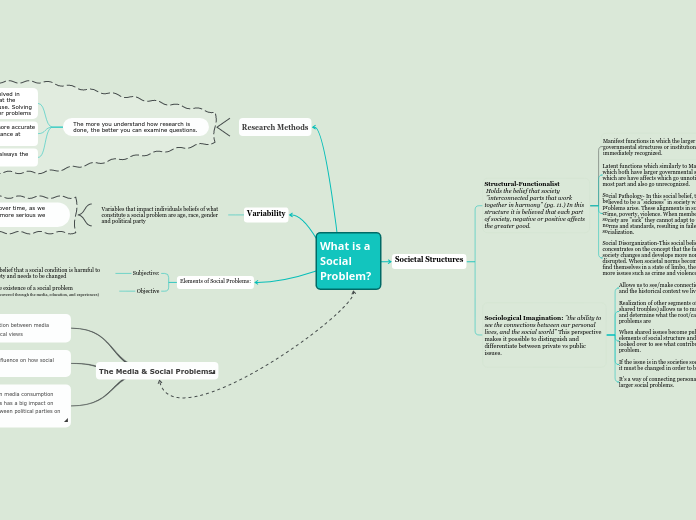What is a Social Problem?
Societal Structures
Structural-Functionalist
Holds the belief that society
"interconnected parts that work together in harmony" (pg. 11.) In this structure it is believed that each part of society, negative or positive affects the greater good.
Latent functions which similarly to Manifest, which both have larger governmental structures which are have affects which go unnoticed for the most part and also go unrecognized.
Social Pathology- In this social belief, there is believed to be a "sickness" in society when social problems arise. These alignments in society include crime, poverty, violence. When members of a society are "sick" they cannot adapt to the social norms and standards, resulting in failed socialization.
Social Disorganization-This social belief concentrates on the concept that the faster a society changes and develops more norms are disrupted. When societal norms become weak and find themselves in a state of limbo, the result is more issues such as crime and violence
Allows us to see/make connections with our lives and the historical context we live in.
Realization of other segments of society (such as shared troubles) allows us to make connections and determine what the root/cause of these problems are
When shared issues become public issues, elements of social structure and culture can now be looked over to see what contributed to the problem.
If the issue is in the societies social structure, then it must be changed in order to be resolved.
It's a way of connecting personal challenges to larger social problems.
Research Methods
Variability
Variables that impact individuals beliefs of what
constitute a social problem are age, race, gender and political party
Elements of Social Problems:
Subjective:
The belief that a social condition is harmful to society and needs to be changed
The more you understand how research is done, the better you can examine questions.
Understanding the difficulty involved in fixing: we don’t all agree on what the problem is or the root of the cause. Solving social problems may create other problems
Knowledge is power: with the more accurate information we have a better chance at solving these problems
The study of social problems is always the quality of life of individuals
Social problems change over time, as we learn certain issues, the more serious we take them.
